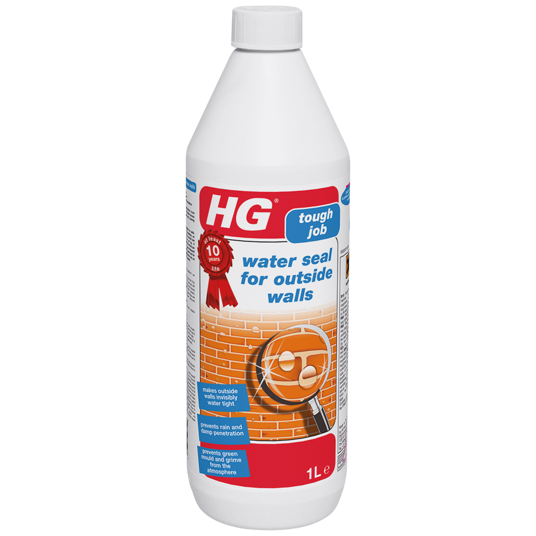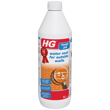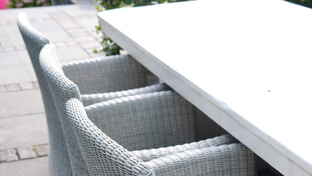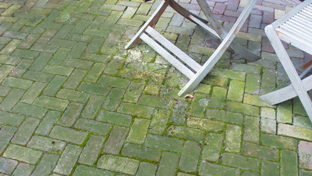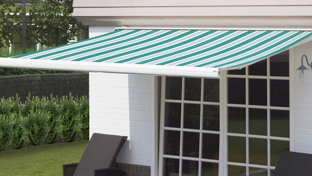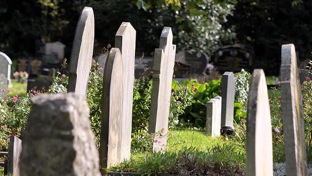HG water seal for outside walls: seal your own walls
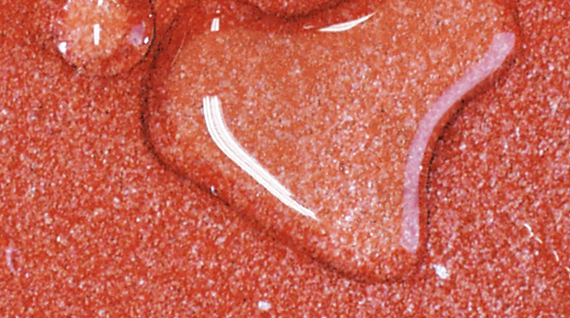 HG water seal for outside walls is a sealant for external walls and prevents damp from penetrating into facades. HG water seal for outside walls has been developed on the basis of the latest technology. Therefore, it lasts at least 10 years.
HG water seal for outside walls is a sealant for external walls and prevents damp from penetrating into facades. HG water seal for outside walls has been developed on the basis of the latest technology. Therefore, it lasts at least 10 years.
The brick-wall sealant is easy to apply. The wall simply continues to breathe. Depending on the porosity of the surface to be treated, 1 litre of product is sufficient for 2 to 10 m2 of surface area. This is how you seal your wall with HG water seal for outside walls:
- To achieve an optimum lasting result, you clean the surface with HG power cleaner. Efflorescence (brick bloom) can be cleaned with HG masonry rash remover. Green deposits can be cleaned with HG algae and mould remover.
- Repair holes, cracks and grouting.
- Cover nearby paintwork, doorsteps, window sills and window frames.
- Treat the surface with 2 or more coats until you achieve saturation (it is better to apply two thin coats than one thick coat).
- Do not treat more than 2 m2 at a time
- Always apply the different coats of HG water seal for outside walls wet on wet.
- Do not apply in the sun or on warm walls.
Do you have damp internal walls? Waterproofing stone walls or brick walls makes a difference
Walls, particularly when they are porous or damaged, absorb moisture and let moisture through. This produces various problems. They could suffer frost damage. The wall absorbs moisture and this expands in freezing temperatures. That causes cracks. A damp wall is more likely to retain dirt and encourages the growth of algae and mosses. Do you have trouble with damp stains, black mould, loosening wallpaper, flaking paint or mould on your internal walls? The cause is often a damp external wall.
Sealing a wall from damp prevents the above problems. Waterproofing outside walls produces the following benefits:
- Your wall becomes water-repellent.
- Your wall is protected against penetrating damp and mould growth. Damp penetrates your facade and then enters your house. By sealing your external walls, you no longer suffer damp problems, such as damp patches and moulds, indoors.
- Your wall stays in good condition, beautiful and clean for longer. By sealing the external wall, the mosses, algae and dirt no longer adhere to the brickwork. After you applied the sealer, the walls stay clean longer. If you do find a slightly dirty patch, this is easy to remove from a sealed wall.
- The lifespan of your external wall increases, because it is protected against external influences such as frost damage. A sealed wall does not absorb moisture and will not crack as a result of frost. That saves on repair work and on costs.
- A clean house without damp problems also increases the value of your house.
7 steps to sealing your wall yourself
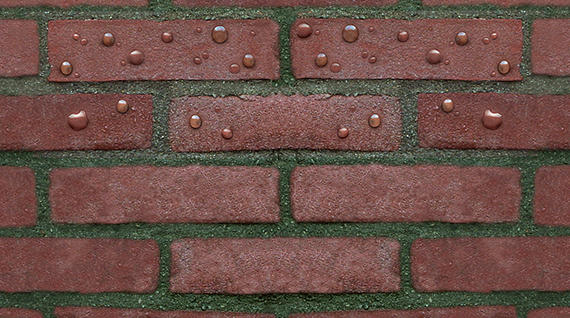 HG water seal for outside walls is the solution for sealing a brick wall. A professional can seal your facade, but you can do it yourself too. Various tips are shared on the internet. HG selected a number of tips you can use to get going. Take the following steps:
HG water seal for outside walls is the solution for sealing a brick wall. A professional can seal your facade, but you can do it yourself too. Various tips are shared on the internet. HG selected a number of tips you can use to get going. Take the following steps:
- Wait until the sun has disappeared from the wall and the wall has cooled down.
- Start on the rainy side of your house. The walls on the rainy side have a lot to endure and benefit most from wall sealing.
- Clean your wall and make sure it is dry and free of dust.
- Repair damaged areas. This makes wall sealing more effective.
- Cover frames, doors and windows. Make sure they are not sealed with the brick sealer
- Apply the seal with a brush, paint roller or low-pressure jet. Work in horizontal strokes from left to right. Start at the top and work down.
- Always treat the surface with several coats until you achieve saturation. It is better to apply several thinner coats than one thick coat. The number of coats required depends on the condition of your external wall.
You don't have to wait until the waterproof coating is dry. You can apply a new coat immediately. This depends on the product you use.
Frequently Asked Questions about sealing a brick wall
Why should you seal a brick wall?
Wall sealing protects your external wall against damp problems, damage to the wall, and dirt. By sealing your wall from damp you prevent those problems and any repair costs.
How to seal a wall from damp?
You can seal your external wall yourself. Take the following steps:
- Start with a cool wall.
- Make the wall dry and free of dust.
- Repair damaged areas.
- Cover frames, doors and windows.
- Work in horizontal strokes. Start at the top and work down.
- Treat the surface with several coats.
Which HG product do you use for waterproofing of walls?
HG water seal for outside walls is a sealant for external walls and prevents damp from penetrating into facades. HG water seal for outside walls has been developed on the basis of the latest technology. Therefore, it lasts at least 10 years.
